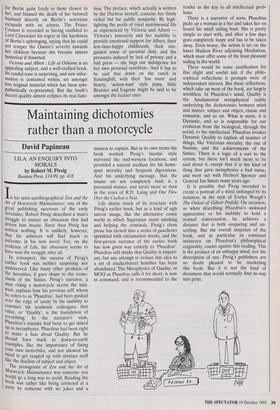Maintaining dichotomies rather than a motorcycle
David Papineau
LILA: AN ENQUIRY INTO MORALS by Robert M. Pirsig Bantam Press, £14.99, pp. 418 In his semi-autobiographical Zen and the Art of Motorcycle Maintainance, one of the great publishing successes of the early Seventies, Robert Pirsig described a man's struggle to master an obsession that had driven him insane. Since then Pirsig has Written nothing. It is unlikely, however, that his admirers will find much to welcome in his new novel. For, on the evidence of Lila, the obsession seems to have won the struggle after all.
In retrospect, the success of Pirsig's earlier book was neither surprising nor undeserved. Like many other products of the Seventies, it gave shape to the icono- clasm of the Sixties. Pirsig's narrator, a man riding a motorcycle across the mid- west, explains how his previous self, whom he refers to as 'Phaedrus', had been pushed over the edge of sanity by his inability to convince his academic colleagues that value, or 'Quality', is the foundation of everything. In the narrator's view, Phaedrus's mistake had been to get mixed UP in metaphysics. Phaedrus had been right to make a fuss about Quality. But he should have stuck to down-to-earth examples, like the importance of fixing Your own motorbike, and not allowed his mind to get tangled up with abstract stuff like the dualism of subject and object. The protagonist of Zen and the Art of Motorcycle Maintainance was someone you would go a long way to avoid. Reading the book was rather like being cornered at a Parry by someone with no jokes and a mission to explain. But in its own terms the book worked. Pirsig's laconic style mirrored the mid-western locations, and provided a natural medium for his home- spun morality and frequent digressions. And his underlying message, that the insane are not completely mad, is a perennial winner, and never more so than in the years of R.D. Laing and One Flew Over the Cuckoo's Nest.
Lila shares much of its structure with Pirsig's earlier book, but as a kind of ugly mirror image, like the alternative comic world in which Superman starts smoking and helping the criminals. Pirsig's clean prose has turned into a series of gaucheries sprinkled with exclamation marks, and the first-person narrator of the earlier book has now given way entirely to 'Phaedrus'. Phaedrus still thinks that Quality is import- ant, but any attempt to reduce this idea to a set of crackerbarrel homilies has been abandoned. The Metaphysics of Quality, or MOO as Phaedrus calls it for short, is now in command, and is recommended to the reader as the key to all intellectual prob- lems.
There is a narrative of sorts. Phaedrus picks up a woman in a bar and takes her on board his small sailing boat. She is pretty ' simple to start with, and after a few days goes completely loopy and has to be taken away. Even worse, the action is set on the lower Hudson River adjoining Manhattan, which must offer some of the least pleasant sailing in the world.
There would be some justification for this slight and sordid tale if the philo- sophical reflections it prompts were of independent interest. But these reflections, which take up most of the book, are largely worthless. In Phaedrus's mind, Quality is the fundamental metaphysical reality underlying the dichotomies between mind and matter, subject and object, classic and romantic, and so on. What is more, it is Dynamic, and so is responsible for our evolution from the biological, through the social, to the intellectual. Phaedrus invokes Dynamic Quality to explain all manner of things, like Victorian morality, the rise of Nazism, and the achievements of the Sixties. There is a logic of a sort to the system, but there isn't much more to be said about it, except that it is the kind of thing that gave metaphysics a bad name, and went out with Herbert Spencer and General Jan Smuts many years ago.
It is possible that Pirsig intended to create a portrait of a mind unhinged by its isolation, in the style of Evelyn Waugh's The Ordeal of Gilbert Pinfold. On occasion, as when describing Phaedrus's awkward appearance or his inability to hold a normal conversation, he achieves a distance that is both unsparing and un- settling. But the overall structure of the book, and in particular its continual insistence on Phaedrus's philosophical originality, counts against this reading. This is the product of an unhappy mind, not the description of one. Pirsig's publishers are no doubt pleased to be marketing this book. But it is not the kind of document that would normally find its way into print.


























































 Previous page
Previous page